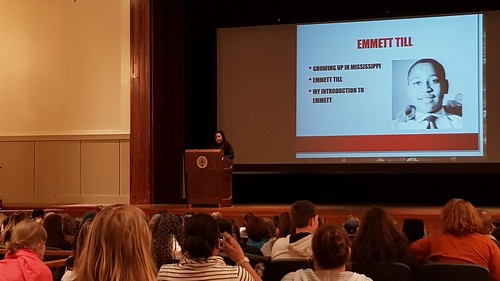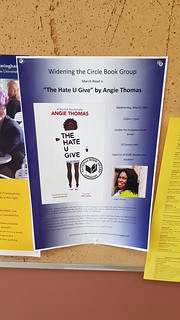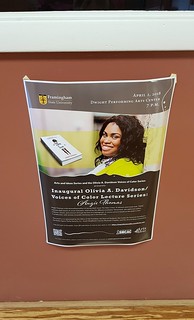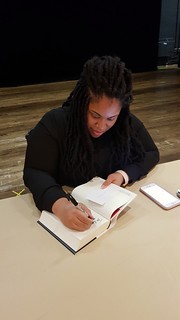Yesterday Angie Thomas, author of the best-selling young-adult novel The Hate U Give, came to Framingham State for an evening talk. In both her talk and the afternoon meet-and-greet that preceded it, Thomas described how she wrote the novel, and she fielded questions from (and offered advice to) the aspiring writers in attendance.
In her afternoon talk, Thomas gave two bits of advice that I scribbled in my notebook as soon as I got back to my office. First, write as if you’re getting paid, and you will end up getting paid. Second, write the book you want (or always wanted) to read.
Thomas described her own childhood, when the characters in the books she read didn’t look, act, or talk like her. In order to write the book she would have loved to have read when she was a young black girl growing up in a neighborhood that made the news only when something bad happened, Thomas had work on her manuscript every day as if that were her job.
In her evening talk, Thomas offered a third bit of writing advice: finish your projects. Thomas admitted how easy it is to move onto a new project when you grow tired or frustrated with a work-in-progress, but she advised against this, arguing that your characters–your ideas–deserve an ending.
I was struck by this image of abandoned projects being like orphaned children who deserve the dignity of a conclusion. I have plenty of half-finished projects languishing on my hard drive; at times, it feels like that is all I have from all these years of faithfully writing. Whenever I revisit the pieces of a half-completed project, I see its raw promise: what a great idea, and what a promising start! But I see, too, the obstacles and obligations that stood in the way: how difficult it is to write as if it were your paying job when it actually isn’t.
In her afternoon remarks, Thomas described the process she used to write The Hate U Give. She was working full-time at a church, and she’d spend her lunch hours typing her draft, hurriedly lowering her laptop screen whenever her reverend boss walking in, not wanting him to see the sometimes-salty language her protagonist, 16-year-old Starr Carter, uses.
Thomas’s account of how she wrote the novel reminded me of Virginia Woolf’s account in “A Room of One’s Own” of how Jane Austen wrote her novels in the family sitting room, hiding her handwritten pages under a sheet of blotting paper whenever family-members approached. Woolf argued that no writer–no woman–should have to hide her work or squeeze it into stolen seconds–she should have a room of her own to work without distraction or interruption.
Somehow, however, both Austen and Thomas managed to finish their novels despite frequent interruptions. You might even say the tight constraints of their writing schedules left them no room to procrastinate: like the former colleague of mine who finished her dissertation during the one afternoon a week her mother was able to tend her children, both Jane Austen and Angie Thomas made the most of the scant time they had.
Angie Thomas no longer has to work for a church; she now has that proverbial room of her own that Woolf described. But Thomas freely admitted it’s taking her longer to finish her second book than it did her first. Probably the most endearing thing in Thomas’s prepared speech and spontaneous remarks was something she said during the afternoon meet-and-greet, after offering her sincere advice to aspiring writers. Don’t listen to writing advice, she urged, including the advice she’d just given.




Apr 3, 2018 at 10:15 pm
this blog is your “room of your own”
LikeLiked by 1 person
Apr 4, 2018 at 10:03 am
thank you for getting back in the rhythm of posting more often!, I missed your wonderful posts.
lisa
LikeLiked by 1 person